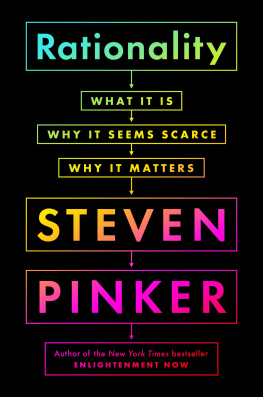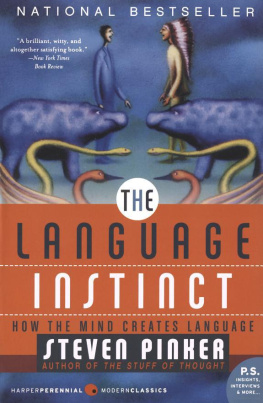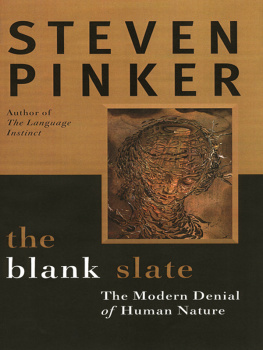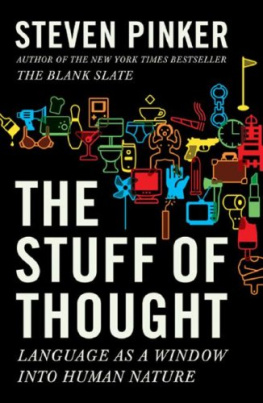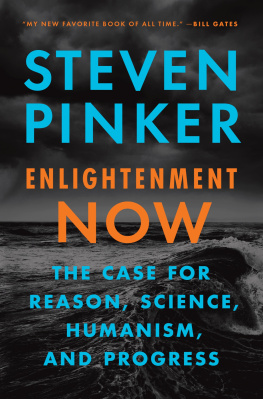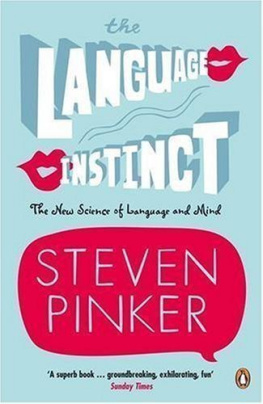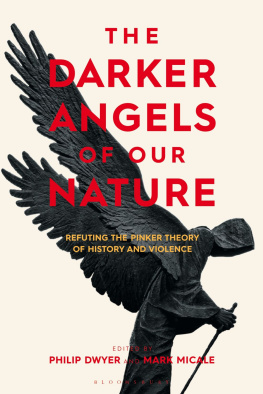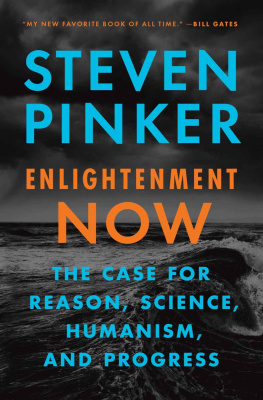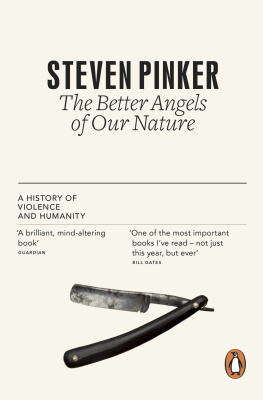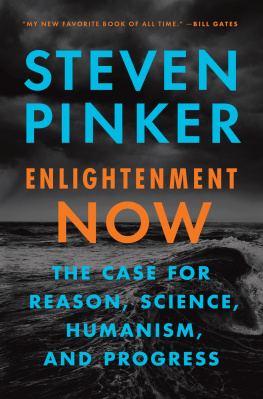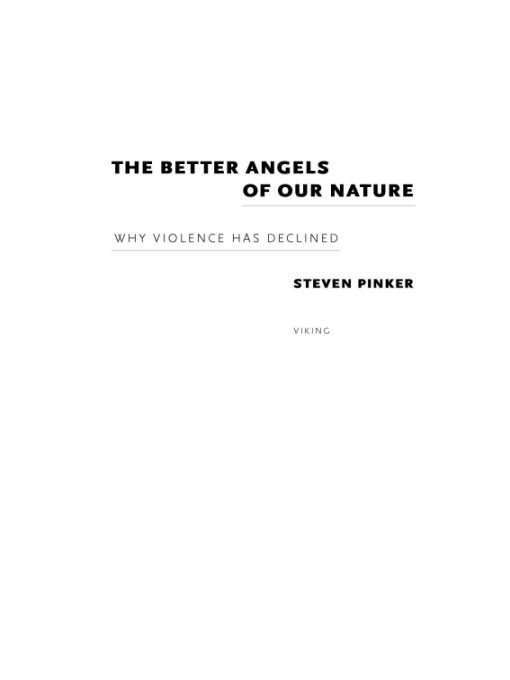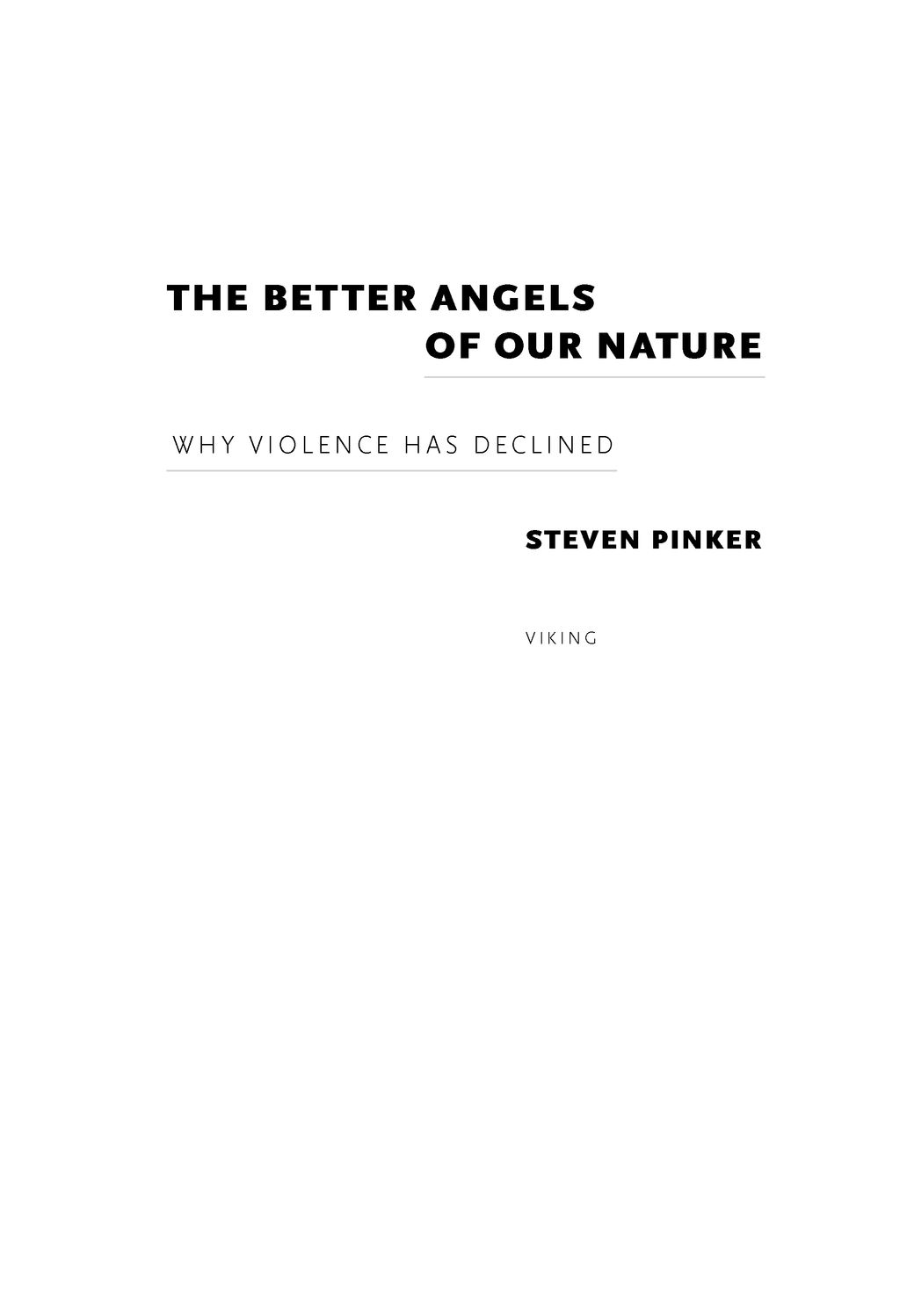Table of Contents
ALSO BY STEVEN PINKER
Language Learnability and Language Development
Learnability and Cognition
The Language Instinct
How the Mind Works
Words and Rules
The Blank Slate
The Stuff of Thought
EDITED BY STEVEN PINKER
Visual Cognition
Connections and Symbols (with Jacques Mehler)
Lexical and Conceptual Semantics (with Beth Levin)
The Best American Science and Nature Writing 2004
TO
Eva, Carl, and Eric
Jack and David
Yael and Danielle
and the world they will inherit
What a chimera then is man! What a novelty, what a monster, what a chaos, what a contradiction, what a prodigy! Judge of all things, feeble earthworm, repository of truth, sewer of uncertainty and error, the glory and the scum of the universe.
Blaise Pascal
LIST OF FIGURES
Figure
Use of the terms civil rights, womens rights, childrens rights, gay rights,
and animal rights in English-language books, 19482000
Time line for the decriminalization of homosexuality,
United States and world
PREFACE
This book is about what may be the most important thing that has ever happened in human history. Believe it or notand I know that most people do notviolence has declined over long stretches of time, and today we may be living in the most peaceable era in our species existence. The decline, to be sure, has not been smooth; it has not brought violence down to zero; and it is not guaranteed to continue. But it is an unmistakable development, visible on scales from millennia to years, from the waging of wars to the spanking of children.
No aspect of life is untouched by the retreat from violence. Daily existence is very different if you always have to worry about being abducted, raped, or killed, and its hard to develop sophisticated arts, learning, or commerce if the institutions that support them are looted and burned as quickly as they are built.
The historical trajectory of violence affects not only how life is lived but how it is understood. What could be more fundamental to our sense of meaning and purpose than a conception of whether the strivings of the human race over long stretches of time have left us better or worse off? How, in particular, are we to make sense of modernityof the erosion of family, tribe, tradition, and religion by the forces of individualism, cosmopolitanism, reason, and science? So much depends on how we understand the legacy of this transition: whether we see our world as a nightmare of crime, terrorism, genocide, and war, or as a period that, by the standards of history, is blessed by unprecedented levels of peaceful coexistence.
The question of whether the arithmetic sign of trends in violence is positive or negative also bears on our conception of human nature. Though theories of human nature rooted in biology are often associated with fatalism about violence, and the theory that the mind is a blank slate is associated with progress, in my view it is the other way around. How are we to understand the natural state of life when our species first emerged and the processes of history began? The belief that violence has increased suggests that the world we made has contaminated us, perhaps irretrievably. The belief that it has xxi decreased suggests that we started off nasty and that the artifices of civilization have moved us in a noble direction, one in which we can hope to continue.
This is a big book, but it has to be. First I have to convince you that violence really has gone down over the course of history, knowing that the very idea invites skepticism, incredulity, and sometimes anger. Our cognitive faculties predispose us to believe that we live in violent times, especially when they are stoked by media that follow the watchword If it bleeds, it leads. The human mind tends to estimate the probability of an event from the ease with which it can recall examples, and scenes of carnage are more likely to be beamed into our homes and burned into our memories than footage of people dying of old age. No matter how small the percentage of violent deaths may be, in absolute numbers there will always be enough of them to fill the evening news, so peoples impressions of violence will be disconnected from the actual proportions.
Also distorting our sense of danger is our moral psychology. No one has ever recruited activists to a cause by announcing that things are getting better, and bearers of good news are often advised to keep their mouths shut lest they lull people into complacency. Also, a large swath of our intellectual culture is loath to admit that there could be anything good about civilization, modernity, and Western society. But perhaps the main cause of the illusion of ever-present violence springs from one of the forces that drove violence down in the first place. The decline of violent behavior has been paralleled by a decline in attitudes that tolerate or glorify violence, and often the attitudes are in the lead. By the standards of the mass atrocities of human history, the lethal injection of a murderer in Texas, or an occasional hate crime in which a member of an ethnic minority is intimidated by hooligans, is pretty mild stuff. But from a contemporary vantage point, we see them as signs of how low our behavior can sink, not of how high our standards have risen.
In the teeth of these preconceptions, I will have to persuade you with numbers, which I will glean from datasets and depict in graphs. In each case Ill explain where the numbers came from and do my best to interpret the ways they fall into place. The problem I have set out to understand is the reduction in violence at many scalesin the family, in the neighborhood, between tribes and other armed factions, and among major nations and states. If the history of violence at each level of granularity had an idiosyncratic trajectory, each would belong in a separate book. But to my repeated astonishment, the global trends in almost all of them, viewed from the vantage point of the present, point downward. That calls for documenting the various trends between a single pair of covers, and seeking commonalities in when, how, and why they have occurred.
Too many kinds of violence, I hope to convince you, have moved in the same direction for it all to be a coincidence, and that calls for an explanation. It is natural to recount the history of violence as a moral sagaa heroic struggle of justice against evilbut that is not my starting point. My approach is scientific in the broad sense of seeking explanations for why things happen. We may discover that a particular advance in peacefulness was brought about by moral entrepreneurs and their movements. But we may also discover that the explanation is more prosaic, like a change in technology, governance, commerce, or knowledge. Nor can we understand the decline of violence as an unstoppable force for progress that is carrying us toward an omega point of perfect peace. It is a collection of statistical trends in the behavior of groups of humans in various epochs, and as such it calls for an explanation in terms of psychology and history: how human minds deal with changing circumstances.


